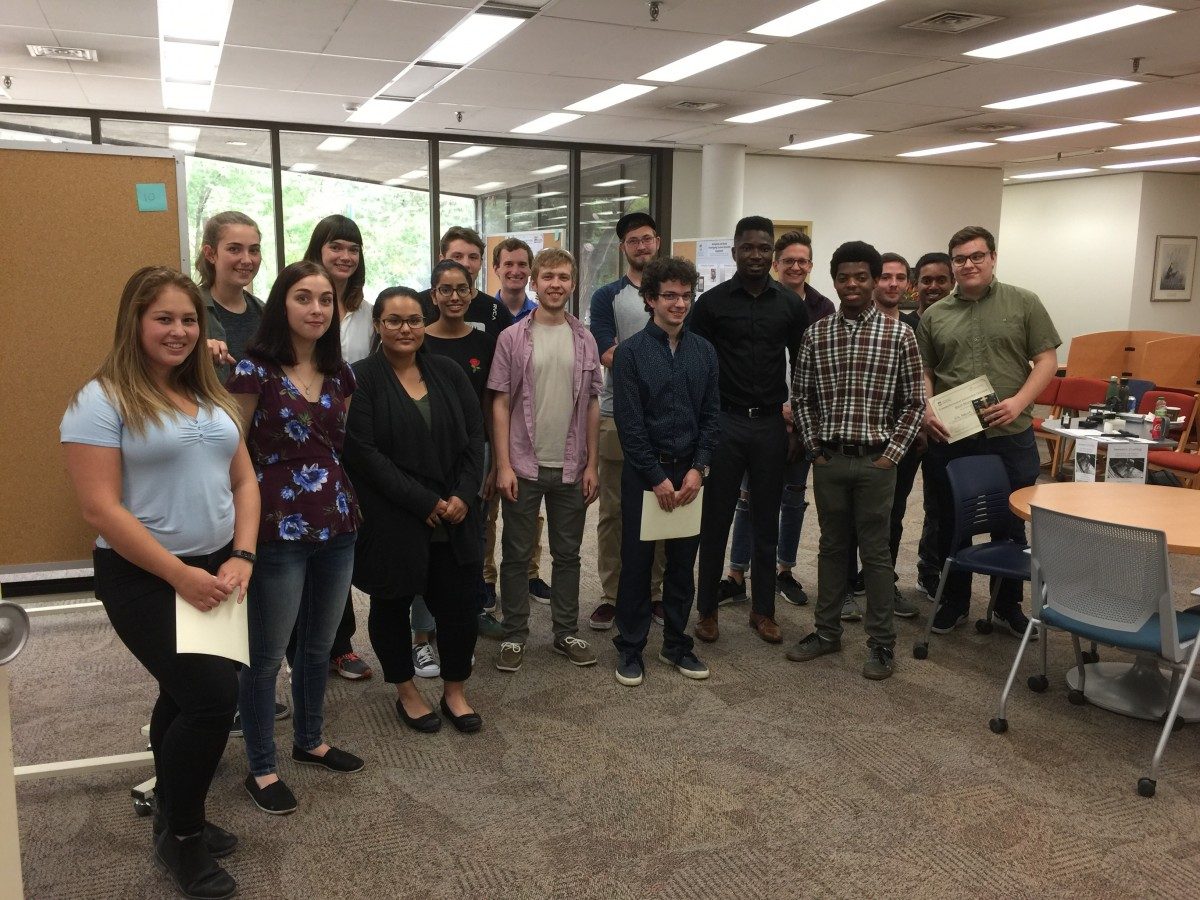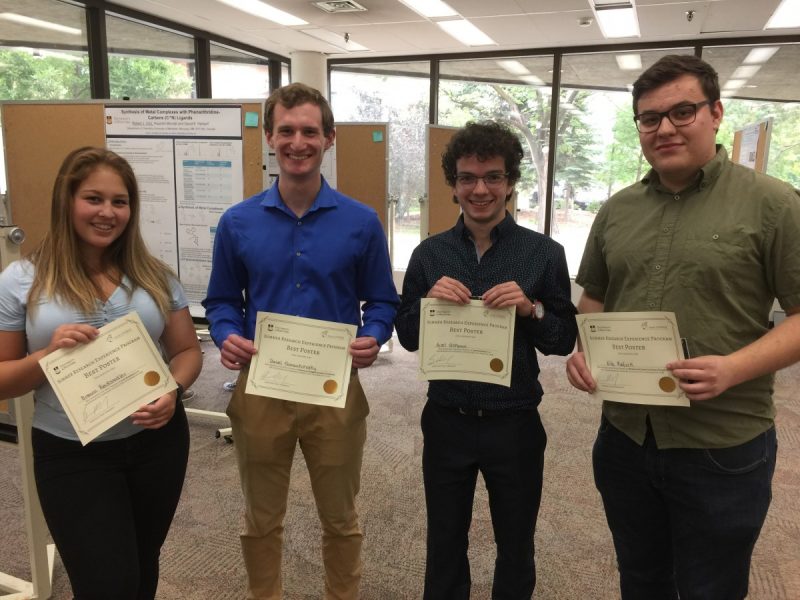
S.U.R.E. Program participants
Summer Undergraduate Research (S.U.R.E.) program helps students navigate careers in science
If you were fortunate enough to find yourself in the Science and Technology Library this past August 16th between the hours of 11:30am and 1:30pm, you would have witnessed the culmination of a summer’s worth of hard work. Undergrads who had worked with researchers in the Faculty of Science all summer long presented their research posters in competition as part of the Summer Undergraduate Research Experience (S.U.R.E.) program.
The poster competition was the final act in what has been a busy few months for those involved with S.U.R.E. Sponsored jointly by the Deans of Research and Student Experience, the program is divided into two streams: 1) physical and computational sciences and 2) life sciences. Since May, there have been near-weekly sessions focused on teaching the 30 or so students skills to which they wouldn’t usually be exposed in class.
The theme of this year’s S.U.R.E. was career development, and its’ goal was to help undergrads prepare for careers in research and science. Program coordinator Kristen Kindrachuk has been the primary force behind the creation and development of S.U.R.E., and is pleased that this second years’ worth of activities have been so productive for the participants.
“The purpose of [S.U.R.E.] is twofold. Number one, we want to better engage our summer undergraduate students at an early stage and help them to navigate their future careers in science, and help them to be aware of the skills that they will need going forward. This year we covered the basics of how to do research in terms of finding information, using libraries, presenting information. How to decide what format you should present it in. Should you opt to present your research as a poster or an oral presentation at a conference? Should you be presenting your work as an original research paper or a review paper and what the differences are.”
If the first objective of S.U.R.E. is to get undergrads geared up for careers in science, the second is to involve grad students in the planning and implementation of the program. Kindrachuk feels that this will give them skills they will be able to use in their own future careers: leadership, mentoring, project management and teamwork.
“For the most part, the sessions were things that the graduate students felt were important, and information that they would have found valuable as undergrads. So by giving them those opportunities, it helps to get them experience that will help them not only in their future careers but also in scholarship applications and things like that.”
Biological Sciences PhD candidate Melanie Lalonde was one of the graduate students who helped make this summer’s S.U.R.E. a success. She sees a great deal of value for undergrads who choose to participate, and feels that the poster competition was a fitting end to a productive summer.
“The sessions are informal and convey a comfortable environment for students to ask questions and receive valuable answers that they may not have otherwise had the chance or confidence to. The poster competition offers unique and useful skills that include critically thinking about the scope of their summer project and how to communicate their progress to a diverse audience.”
Given by department heads or department representatives, the sessions were meant to inform participants about the various types of research that are going on in the Faculty of Science. Students were encouraged to identify mentors or supervisors, as well as look for a lab in which to work if that was their preference as they pursued grad studies.
One session in particular dealt with careers in academia. Faculty members spoke about their own career trajectories and offered advice to students. Kindrachuk speculates that many undergrads assume that becoming a professor is fairly straightforward, when the reality now is that the process can be much more convoluted. She stressed that while a life in academia is possible, it may not be the best option for everyone. For those students not destined for a life in academia, S.U.R.E. helps to give an idea of what they can expect and what they should be doing at all stages of their training.
Participants such as Raelene Engelberg, currently part of Dr. Ayush Kumar’s lab in the Department of Microbiology, are positive that S.U.R.E. was time well spent:
“The summer research experience provided some great insight into what comes after my education. I feel that I’ve received valuable advice for how to connect with future employers, both in and out of a research setting.”
Chemistry undergrad Olamide Sogeke also found the program a good use of his summer. He says it was “an honour” working under the supervision of Dr. Jennifer van Wijngaarden and her research team.
“Everyone played a key role in shaping my understanding of microwave spectroscopy and gaining some valuable technical skills. I wish to say that our first discovery of the global minimum structure of allyl isocyanate was my favorite part of the research, but in truth, it is nothing compared to the overall self-growth that I felt throughout my time as an undergraduate research student.”
Winners of the 2018 Summer Undergraduate Research Experience Poster Competition were as follows:
- Life Sciences: Daniel Gussakovsky and Breann Recksiedler
- Physical and Computational Sciences: Ariel Glikman and Nils Refvik

S.U.R.E. Program Poster Competition Winners 2018.
Research at the University of Manitoba is partially supported by funding from the Government of Canada Research Support Fund.






